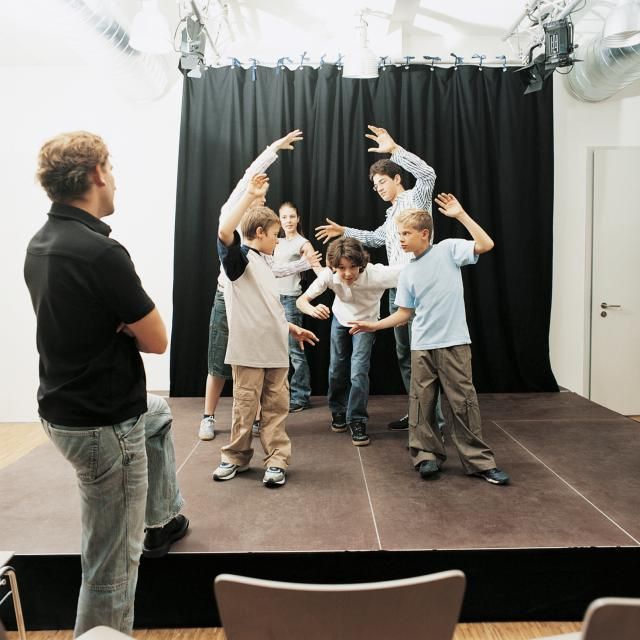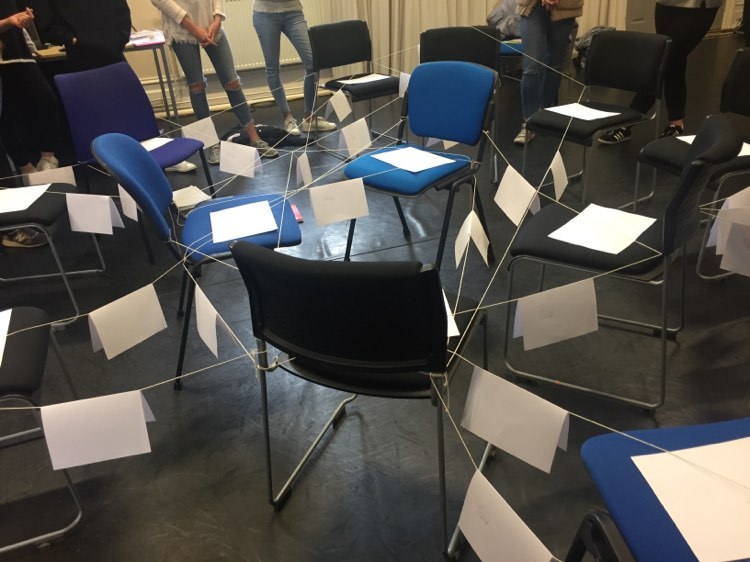
The children and young people module, completed in the second year of my degree, was by far the most inspiring module to date. Over a period of 12 weeks, I was part of a group of 5 peers, who were responsible for creating and co-facilitating five drama workshops, with young people aged 11-15, from Winifred Holtby Academy in Hull. This was my first encounter of working with young people in an educational setting and introduced how facilitation could be used to tackle problematic subjects that required more than simply disseminating information. This module began with a group viewing of the live, issue-based drama, ‘It’s not OK’, performed by York St John drama and theatre alumni, and was written and directed by current senior lecturers, Jules Dorey-Richmond and Rachel Conlon (Success for York St John University online safety play commissioned by NSPCC, 2018). The performance focused on the preliminary stages of child abuse, online grooming, sending of indecent images via a multimedia messaging app (Snapchat) and child sexual exploitation, whilst exploring relationships and emotional responses. The performance introduced 4 characters who were embroiled within each element and ended whilst the characters were amidst their difficulties. This was done to enable pupils to thoroughly explore the content and allow them to identify the various routes that the characters could take, to overcome their plights. The performance was followed by a workshop lead by the 4 actors, which allowed the pupils to ask questions and complete activities that enabled them to analyse and explore potential outcomes. This workshop also allowed me to experience a co-facilitated workshop, which prepared me for the rest of the module.
Co-facilitating the workshops was an enormous responsibility, as we had only met the students once and were not aware of who we would be working with. Although most of the co-facilitators had experience of drama workshops, not everyone had devised and created them, and certainly not regarding the subject that we were dealing with. As a group of co-facilitators, we discussed our ideas as we planned the first workshop, ensuring that we had a range of activities for the 90-minute session, that would engage the students. As a large co-facilitation group, we were able to practice the activities before we included them in our session plan, which was advantageous as it prepared us for any physical issues that might occur. We also had to make sure that we approached the subject with caution, discussing our safeguarding responsibilities, which lead to us agreeing that each session would start and end with an emotional check in. We felt this was important due to the content that the workshops were based around and wanted to provide closure to the session, so that the students could leave the content behind. Our first workshop went smoothly, with positive comments from the students at the end of the session, stating that the emotional check in and out helped them to remove anxieties of working with new facilitators and made them feel at ease before they left. Oher positive comments focuses on the activities that they completed such as the ‘talking tableau’ where the students froze in a poignant image, then one by one, the students would comment on what their character was thinking. Students were engaged in the task and stated that it was beneficial to explore the characters in this way and liked the improvised nature of the task. We used the feedback to help prepare the next workshop.

When facilitating the second workshop, we encountered an issue when an activity that we had planned, was unsuccessful. I felt that because our first session had gone so well, as a group of facilitators we had relaxed a little too much, had not planned and discussed the activities thoroughly and had not considered a contingency plan. This resulted in the session content being delivered too quickly, which lead to us having to respond in the moment and improvise a further activity. At this point I was needed outside of the space, as a teacher informed me of an ongoing safeguarding issue with a pupil in our group who had asked not to be involved in the workshops anymore, because it was uncomfortable for her. I explained to the teacher that we wanted to include all students in the workshops, so would adjust future sessions accordingly, so she could continue to participate. After the teacher had explained this to the pupil, they were happy to continue. Following on from this session, the co-facilitators reflected on the workshop and agreed that we would always prepare additional activities to deliver and that we would no longer include the particular theme that the student had been unable to deal with, emotionally. This experience prompted me to gain a better understanding of ‘responsivity’, a term coined to describe how ‘in the moment’ changes are made by facilitators (Preston & Balfour, 2017). The 4 elements within the concept of responsivity are; awareness (of the participants and the context of the theme), anticipation and adaptation (planning and delivering the workshop, whilst adapting to the changing dynamics of the group), attunement (responding to the participants’ in an empathetic and knowledgeable manner) and respond-ability (being able to learn and develop from your own work). Possessing an awareness of responsivity enabled better planning and preparation of the workshops and has also remained prominent throughout my continued work at university and beyond.
Completing this module gave me the experience and knowledge to confidently create and deliver drama workshops that provided agency to young people, to allow them to discuss and explore difficult social and emotional issues, creatively. It also helped me to understand the importance of providing a safe and supported environment, which will be beneficial to my future in drama education.
References
Preston, S. and Balfour, M., 2017. Applied Theatre. London: Bloomsbury Publishing.
York St John University. 2018. Success For York St John University Online Safety Play Commissioned By NSPCC. [online] Available at: <https://www.yorksj.ac.uk/news/2018/its-not-ok-play-for-nspcc-campaign/>.
